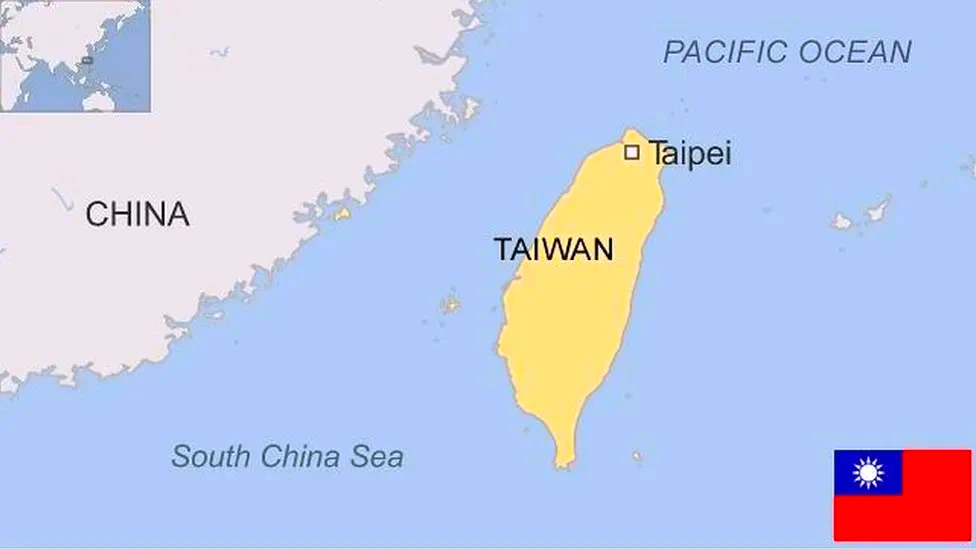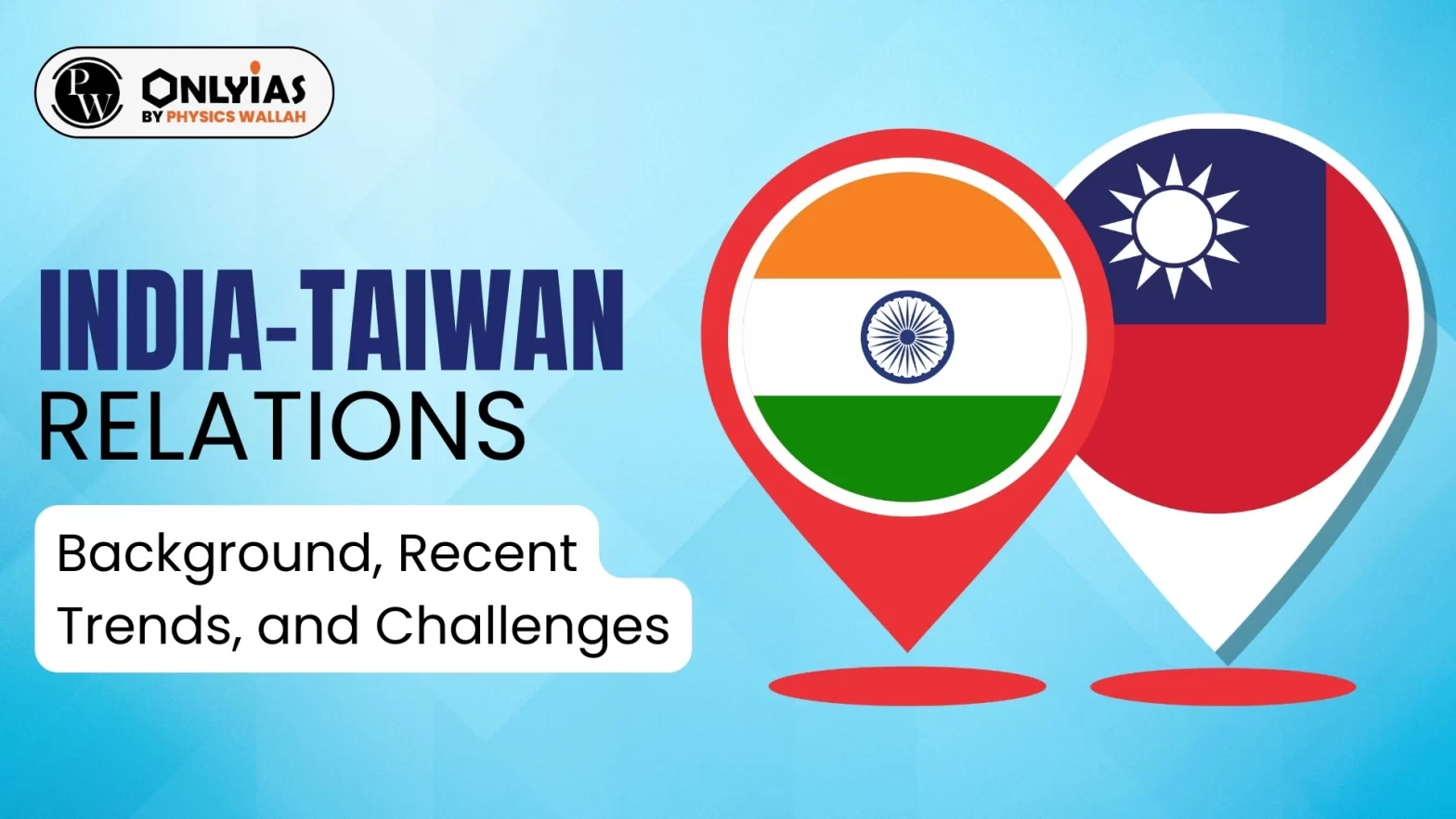Context:
This article is based on the news “Taiwan in the balance” which was published in the Business Standard. The recent elections in Taiwan, amid heightened tensions with China over the One China Policy, have drawn attention worldwide and in India too.
| Relevancy for Prelims: Indo-Pacific Region, Taiwan Map, New Southbound Policy, One-China Policy, and Act East Policy.
Relevancy for Mains: India Taiwan Relations: Background, Recent Trends, Challenges, and Way Forward. |
Why China-Taiwan Relations Are So Tense
- The ruling Democratic Progressive Party (DPP) secured a historic third consecutive term in legislative elections in Taiwan despite warnings and aggression from China.
- Taiwan’s legislative assembly is in an unprecedented situation as there is no clear majority for the first time in two decades, adding complexity to policymaking and relations with China.

Taiwan Map
Evolving India Taiwan Relations
- Background: India’s “One-China” policy traditionally limited engagement with Taiwan despite formal ties established after the Cold War.
India Taiwan Relations: Recent Trends
- Since 2019, there has been a growing awareness of the need for a recalibrated approach towards Taiwan because:
- Deteriorating India-China Relations: Border clashes and China’s assertive regional stance prompted India to diversify its foreign policy and strategic partnerships. The Galwan clash of June 15-16, 2020 marked a watershed in India-China ties.
- Indo-Pacific Geopolitical Dynamics: The strengthening of US-India cooperation and the Quad grouping’s rise in the face of China’s challenge highlighted the potential significance of Taiwan as a key player in regional security.
- Chinese Aggression: India’s internal discourse is shifting towards exploring options for deeper engagement with Taiwan, driven by concerns about potential Chinese aggression and its implications for regional security, including India’s own territorial disputes with China.
|
Various Facets of India Taiwan Relations
- Economic Cooperation: Bilateral trade between India and Taiwan has witnessed a rise, from US $1.19 billion in 2001 to US $8.45 billion in 2022.
- For Example, 106 Taiwanese companies have invested USD 1.5 billion across various sectors in India, including IT, medical devices, and automobile components.
- Science & Technology Cooperation: An MOU on Scientific and Technological Cooperation was signed in 2007, resulting in 115 projects, joint proposals, and 25 agriculture, healthcare, and disaster management seminars.
- Education Collaboration: An MOU with the Association of Indian Universities facilitates mutual recognition of academic degrees, fostering research collaboration.
- At present, 26 Taiwan Education Centers (TEC) are established in different Indian universities, where instructors from Taiwan impart Mandarin language instruction.
- Cultural Exchanges: Cultural exchanges between Taiwan and India have grown significantly recently.
- For Example: Taiwan films are now a regular feature at major Indian film festivals each year. The India-Taiwan Parliamentary Friendship Forum was established in 2016 as a formal platform for fostering friendship.
“New Southbound Policy (NSP)”
- NSP launched in 2016 aims to leverage Taiwan’s cultural, technological and economic assets to enhance its regional integration and promote broader development of the Indo-Pacific region.
|
- Diplomatic Engagement: India does not have formal diplomatic ties with Taiwan. However, Taiwan has identified India as a top priority under its New Southbound Policy, focussing on trade, commerce, economic cooperation, talent exchange, resource sharing and regional connectivity.
- Strategic Partners: Both India and Taiwan perceive China as a threat, and seek to boost and strengthen their strategic partnership and cooperation
| India was among the first non-communist countries to recognize the People’s Republic of China (PRC) in 1950, swiftly endorsing the One-China Policy and supporting the PRC’s claim to the United Nations Security Council (UNSC) seat held by Taiwan until 1971.
One China Policy:
- It is a diplomatic recognition of China’s position, affirming the existence of a singular Chinese government.
|
Challenges in the India Taiwan Relations
Recognition of ‘One-China’ Policy: India’s endorsement of ‘One-China’ policy left little room for practical engagement with Taiwan. Most countries that adopted the ‘One-China’ policy maintained commercial and low-key political contacts with Taiwan.
- China’s Displeasure: India’s engagement with Taiwan encounters a significant hurdle in China’s strong opposition to establishing formal diplomatic relations.
- Transactional Nature of India Taiwan Relations: The India Taiwan relationship has hitherto been largely transactional.
- For example: In seeking Mandarin expertise and intelligence, India engages Taiwan, while Taiwan aims to leverage India’s vast market and enhance its diplomatic standing.
- Such direct quid pro quo approaches are seldom successful in international politics.
- Barriers to Economic Collaboration: Economic collaboration and investment opportunities have been constrained by inadequate comprehension of local markets, corruption issues, tax regulations, and linguistic and cultural barriers.
Way Forward to the India Taiwan Relations
India’s stance towards Taiwan is at a crossroads, with internal and external factors pushing for a more proactive engagement.
- Tapping Act East Policy: India’s existing Act East policy serves as a foundation for increased engagement between the states of north-eastern India and Southeast Asia, providing an established platform for Taiwan to position itself as integral to India’s future economic growth.
- Boosting Economic Cooperation: India should designate Taiwan as a consultative partner in its Make in India initiative. Simultaneously, Taiwan should also proactively contribute to its South Asian Silicon Valley development project under the Digital India initiative.
- Pursue a more Consistent and Pragmatic Approach: India needs to balance China’s growing influence in the region. Building a closer relationship with Taiwan could be a strategic hedge against China’s dominance.
- However India should not indulge in tit-for-tat games and instead focus on building a substantial interdependent relationship with Taiwan.
- Strengthen Trade and Technology Cooperation: An India-Taiwan Free Trade Agreement and technology transfer in semiconductors and green energy would benefit mutually.
- Taiwan produces nearly 70% of the world’s semiconductors and over 90% of the most advanced chips required for almost all electronic equipment such as smartphones, car components, data centers, fighter jets, and AI technologies.
- Promote People-to-People Exchanges: India should institutionalize ties with the Indian diaspora in Taiwan and encourage skilled Indian workers to fill job vacancies in Taiwan.
Conclusion
India and Taiwan must carry a consistent and pragmatic approach, away from China’s shadow. The relationship between the two democracies can open up new avenues for collaboration, particularly in trade, technology, and people-to-people exchanges
Also Refer: Strait of Malacca Dilemma: Analyzing India’s Options in the Middle USA-China Taiwan Tensions
![]() 17 Jan 2024
17 Jan 2024

